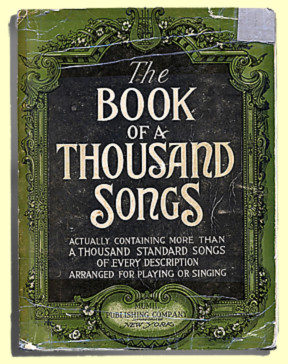.
 Continuing our methodical walk through The Book of a Thousand Songs [Wier, 1918]
Continuing our methodical walk through The Book of a Thousand Songs [Wier, 1918]p 34: "The Blue Bells of Scotland" Scottish folk song written by Dora Jordan and first published in 1801. Sufficiently well known that I've heard of it, maybe because Leroy Anderson made a version of it.
"Boat Song" by Carl Maria Von Weber. Can't find any references to this, so it could be a repurposed opera aria, or an idiosyncratic translation.
"Blow, Boys, Blow" (A Hoisting Chantey Song) is originally from slave-trading days, but the references to the Congo River and race are not included in the two short verses reprinted here. (Except in very special cases, this book only gives two verses of a song, period.)
p 35: "Baby Mine," an 1874 sentimental song about a father coming home from the sea, by Archibald Johnson. I looked up the remaining verse and was surprised to find that the father did not meet a horrible fate just before coming home.
"Baby Bunting," an anonymous lullaby with a pleasant lilt. This was on an album of lullabies I used to play to Sarah sometimes at bedtime.
"Baa! Baa! Black Sheep" is a nursery rhyme to the same tune as "Twinkle, Twinkle, Little Star," and "A, B, C," and the French "Ah! Vous dirai-je, Maman," for which Mozart wrote some variations that are still popular.
p 36: "Bonnie Charlie" is a traditional Scots tune used for a setting to a poem by Lady Nairne (Carolina Oliphant), known for "saccharine imitations of Jacobian songs." This is an imitation of a Jacobian song, set in the days of Bonnie Prince Charlie, who reportedly was hosted by her family back in the day. Book credits Finley Dun, who doesn't seem to have a thing to do with it.
"The Blue Juniata" was immensely popular in the 19th century. Mark Twain mentioned it, the Sons of the Pioneers recorded it in 1937, with the deep voice and fiddle of Hugh Farr front and center. Mrs. Marion Dix Sullivan wrote it in 1844.
"Ba-Be-Bi-Bo-Bu," uncredited in the book, appears to be by my main man, Philadephia composer Septimus Winner! Just eight bars long, it gets longer if you put every consonant in the alphabet into it for twenty-one verses. Ca-Ce-Ci-Co-Cu, and like that there. Also known as "Spelling Bee," and it could predate Winner (who was often just collecting and publishing songs, and complicated the issue sometimes by using other names and so on). It lived on well past him in a different form as "Swinging the Alphabet," and was used in the 1938 Three Stooges short Violent is the Word for Curly (where they stopped just short of an apparent naughty word in the F verse), as well as the 1980 cult film FORBIDDEN ZONE (which sang the F out of the F verse) that was Danny Elfman's first movie score. It's the only song Larry, Moe, and Curly sang in its entirety, lip-synching their own voices.
p 37: "Begone! Dull Care" is found in Playford's 1687 Musical Companion, and might be by him or might not. It's a recurring joke in a series of comic strips by "Little Nemo" creator Winsor McCay, who depicts a character lugging a satchel with the words DULL CARE on it. Metaphor. At first it sounds like it's going to be "Plaisir d'Amore," but not quite.
"Blow The Man Down" is a well-known sea chantey, written before the 1860s. The title seems to refer to either a man being knocked over by a swinging sail, or a man-of-war suffering a loss of balance that could be pretty serious. Author? Yeah, right.
"Bohunkus" uses the tune of "Auld Lang Syne, and apparently originated around 1891 at Ohio State University, where it was a favorite of the Men's Glee. The burlesque lyrics concern a pair of brothers, Bohunkus and Josephus, who each had a suit of clothes, went to the theater, and died. One went to heaven, the other to a place that varies from one singer to the next. Some say Hell, some say Delaware or Michigan.
p 38: "The British Grenadiers" has a tune that seems to date back to early 17th century. It shows up in Playford in 1728 as "The New Bath," and was first printed as "The Granadeer's March" in 1706, gaining its lyrics between 1735-50. It's been an official march in a number of militaries for centuries now.
"The Brown Hair'd Maiden" is a Scotch song (it says here), whose traditional lyrics were translated into English in the 19th century by Scottish poet John Stuart Blackie. It's been used as a regimental march. Original title was "The Nut Brown Maiden" and some continue to use this title.
p 39: "The Bridge" has a definite writer and composer: Henry Wadsworth Longfellow and Maria Lindsay (who also composed as Mrs. J. Worthington Bliss, and I wonder if the "Honest John" character in Pinocchio got his name--J. Worthington Foulfellow--from this monicker). The song is a somber one, with the author contemplating suicide. I don't know how it comes out, and whether her husband the Reverend would have approved if the song surrendered to the urge to self-terminate. This version, which fills a whole page, is (like most of the book) a choral rendition, and I might be missing all sorts of cool accompaniment figures. The only recording I found in a cursory web search has someone singing it with his own accompaniment.
No comments:
Post a Comment